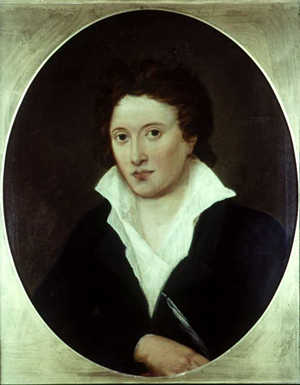|
|
2. Percy Bysshe Shelley(1792-1822)

Percy Bysshe
Shelly was the Romantic poet who probed in art the deepest among the second
generation. Most of his poetry reveals his philosophy, a combination of
belief in the power of human love and reason, and faith in the
perfectibility and ultimate progress of man. His lyric poems are superb in
their beauty, grandeur and mastery of language.
Percy Bysshe Shelley, born at Field Place near Horsham,
in 1792 and destined for a parliamentary career, was the son of Sir Timothy
Shelley, the M.P. for New Shoreham who then sat for a seat under the control
of the Duke of Norfolk and supported his patron’s policies of electoral
reform and
Catholic Emancipation.
Shelley was active, mischievous and highly imaginative child. He was
educated at
Eton and Oxford University where he was deeply unhappy and
rebellious, because he was often mocked and bullied as “Mad Shelley” and
“Eton Atheist”. At the age of twenty-one when still as a student in
university, he inherited his father’s seat in Parliament, where he met Sir
Francis Burdett, the Radical M.P. for Westminster. Shelley, who had
developed a strong hatred of tyranny while at Eton, was impressed by
Burdett, and in 1810 dedicated one of his first poems to him. At university
Shelley began reading books by radical political writers such as
Tom Paine
and
William Godwin. At his college life, Shelley wrote some articles to
defend Daniel Isaac Eaton, a bookseller charged with selling books by Tom
Paine, and Richard Carlile the much being persecuted Radical publisher. He
also wrote The Necessity of Atheism, a pamphlet that attacked the idea of
compulsory Christianity. Oxford University was shocked when they discovered
what Shelley had written and on 25th of March, 1811 he was expelled.
Shelley quarreled violently with his father, and eloped to Scotland with
Harriet Westbrook, the sixteen-year-old daughter of a coffeehouse keeper.
Thus Shelly began his three years of nomadic existence. This created a
terrible scandal, which made his father never forgive him for what he had
done. Shelley moved to Ireland where he made revolutionary speeches on
religion and politics. He also wrote a political pamphlet A Declaration of
Rights, on the subject of the French Revolution, but it was considered to be
too radical for distribution in Britain.
Percy Bysshe Shelley returned to England where he became involved in radical
politics. He met William Godwin. Shelley also renewed his friendship with
Leigh Hunt, the young editor of The Examiner. Shelley helped to support
Leigh Hunt financially when he was imprisoned for an article he published on
the Prince Regent.
Leigh Hunt published Queen Mab, a long poem by Shelley celebrating the
merits of
republicanism,
atheism,
vegetarianism and free love. Shelley also
wrote articles for The Examiner on political subjects including an attack on
the way the government had used the agent provocateur William Oliver to
obtain convictions against Jeremiah Brandreth.
In 1814 Shelley fell in love and eloped with Mary, the sixteen-year-old
daughter of William Godwin. Harried by creditors, ill health and “social
hatred”, the couple traveled to Europe and lived permanently abroad from
then on. Shelley continued to be involved in politics and in 1817 wrote the
pamphlet A Proposal for Putting Reform to the Vote Throughout the United
Kingdom. In the pamphlet Shelley suggested a national referendum on
electoral reform and improvements in working class education. In the spring
of 1819, he began to work on Prometheus Unbound, a drama adopted from Greek
tragedian
Aeschulus. In this play, Shelley displays four noble qualities in
the image of Prometheus: intellect, heroic endurance, defiance against
tyranny and the love of humankind.
From the summer of 1819 to 1820, Shelley reaped his great harvest in
literary life. Shelley was in Italy when he heard the news of the
Peterloo
Massacre happened in England. He immediately responded by writing The Mask
of Anarchy, a poem that blamed Lord Castlereagh, Lord Sidmouth and Lord
Eldon for the deaths at St. Peter’s Fields. In The Call to Freedom Shelley
ended his argument for non-violent mass political protest with the words:
“Rise like lions after slumber
In unvanquishable number --
Shake your chains to earth like dew
Which in sleep had fallen on you --
Ye are many - they are few.”
In this year, Shelley also wrote the Ode to West Wind, the satirical Peter
Bell The Third. And 1820 witnessed his long political odes To Liberty and To
Naples, the lively, intimate Letters to Maria Gisborne and the Witch of
Atlas. Much of this work was inspired by news of political events. At the
same time, he dashed off several pure lyric pieces including To a Skylark
and The Cloud. However, despite this period of creativity, Shelley could get
little accept from English publication, and he felt increasing isolated and
despondent.

|
![]()

